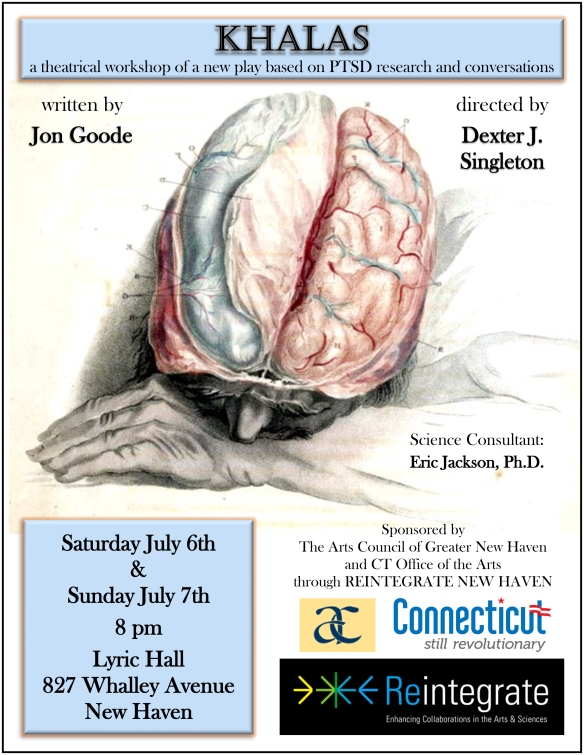Reintegrate Team Update: Living with Post-Traumatic Stress Disorder

The End of Reintegrate? No, it’s just the beginning!
Dexter J Singleton
We were able to present KHALAS over the course of two evenings, July 6-7, 2013 at Lyric Hall, a performance venue in New Haven, CT. We received full houses each night and had great conversations during our post show receptions. Some of these audience members expressed to us their own experiences as soldiers, loved one of military personnel, or advocates for mental health. The powerful discussions around war and PTSD we hoped for have begun, inspiring others to explore changes in the national mental health care system.
Reintegrate gave us a platform with funding, networking and marketing to create a project that can continue beyond its initial inception. One of our artistic goals in creating this new play was to explore long-range production and touring opportunities. We would like to turn KHALAS into a full production that we can produce in a longer performance schedule eventually gaining momentum for potential touring opportunities both statewide and nationally. We are currently revising the production, while seeking additional funding resources.
This experience has helped my growth in a number of ways as a person, artist and collaborator. This project marked my first collaboration with a scientist. In my work with my theatre company, Collective Consciousness Theatre, we often collaborate with schools and local social service agencies to create both workshops and new plays, so I was used to working with others to achieve a particular outcome artistically. Science was always my toughest subject in school, the area I struggled in the most. Reintegrate was an opportunity to tackle that fear, a chance to run toward it and succeed by using my established tools as an artist. I learned a tremendous amount about the brain, how it works, and the general biology of the body. I’d had some knowledge of PTSD and its effects, but not to the extent of what I learned worked with Dr. Eric Jackson. He made it easy to absorb and simplified it, allowing me for the first time in my life to think of science as fun. Dr. Jackson and I had been long time friends, but this project gave us the opportunity to learn more about each other’s careers and one another. We had to trust one another to make it work.

The turnaround time on this project from idea to performance was incredibly short. In the professional theatre new plays are usually developed for years before finding their way to the stage. We spent a mere two months completing the script, casting, rehearsing and performing the final product, a theatrical workshop of our new play titled KHALAS. We knew to be successful we needed to simplify everything production-wise by having minimal production values, creating high quality artistic work with a simple set, costumes, lighting, and sound. We focused our rehearsal time on exploration of the text and building strong, three dimensional characters that exemplified the conditions of the human spirit. We brought on additional artists who served in onstage roles as well as those on film, voice over, and backstage. This funding allowed us to hire artists, giving them stipends for their time and labor on the project. It ensured that we had the opportunity to work with talented local artists whose expertise allowed us to be successful in a condensed time frame.
Every project I work on is an opportunity to improve at my craft. I am an artist that is dedicated to social change through theatre. I use my art to explore subjects of socially relevance both locally and globally, hopefully inspiring others. The PTSD subject matter is one that was close to my heart and having the chance to work on it, examining my own beliefs and others around the stigma of mental health in our country was great. This project offered its challenges; exploring science, artist collaborating with a research doctor, having conversations in the field and presenting this work to my community, one that faces the enormity of life’s challenges each day. I know I am a better artist and collaborator because of Reintegrate. This is a project that takes much longer than eight months to complete, but through the funding and general support of The Arts Council of Greater New Haven it has given us a head start on the road to success.
We look forward to our next production of KHALAS!
Our Special Thanks to The Arts Council of Greater New Haven, CT Office of the Arts, Wesleyan University, Amanda May, Cindy Clair, Lyric Hall, Bregamos Community Theatre and our wonderful production team; Jon Goode, AJ Lovelace, Vanessa Butler, Jeremy Funke, Alex Burke, Laki Valakas, Akintunde Sogunro, and Cindy Davis.

 Reintegrate Team Update:
Reintegrate Team Update: 
 Reintegrate Team Update:
Reintegrate Team Update: 



